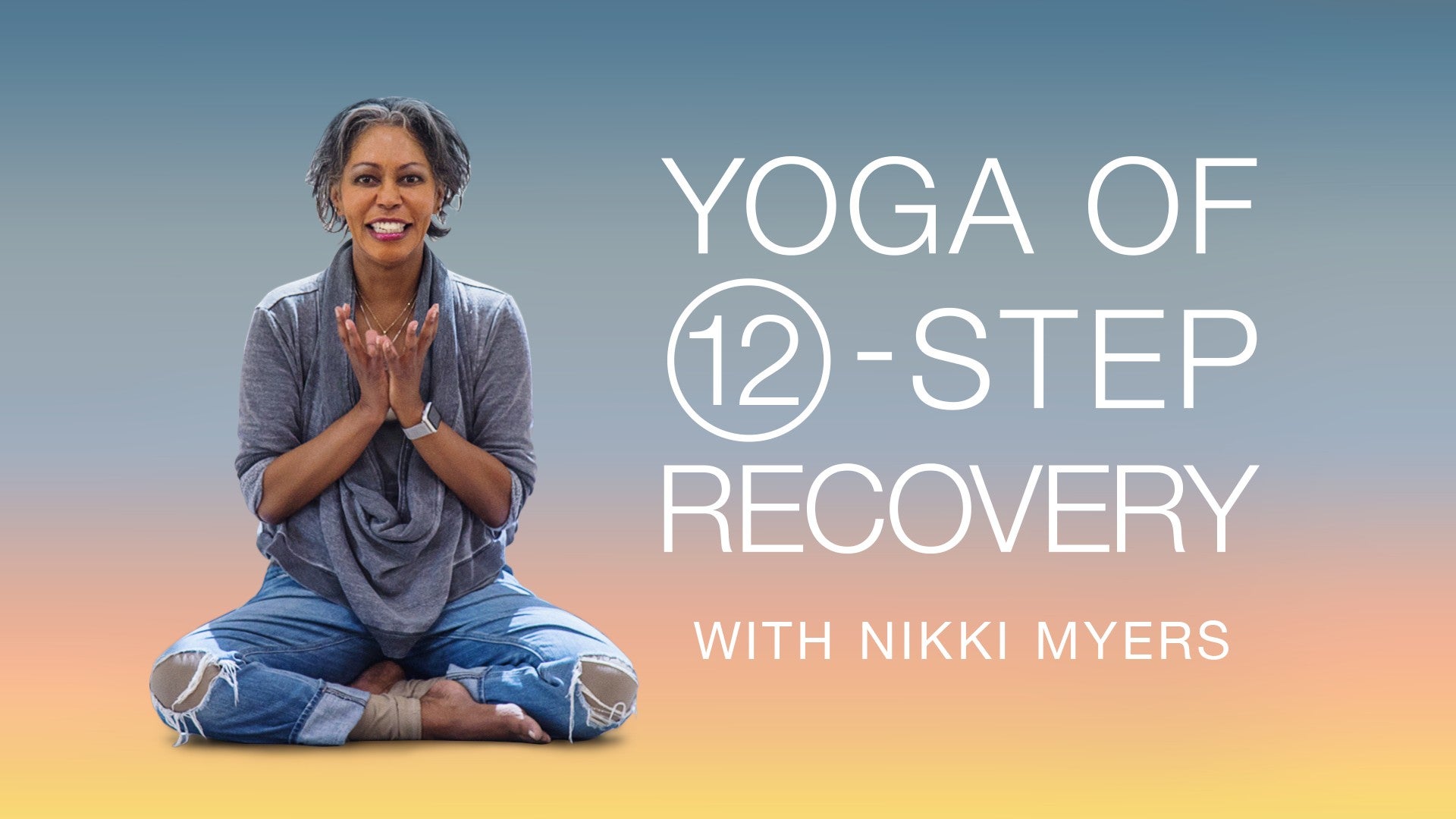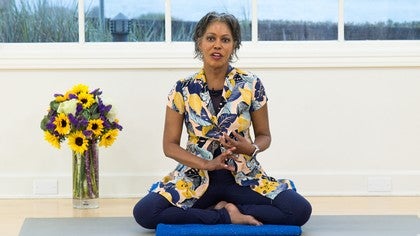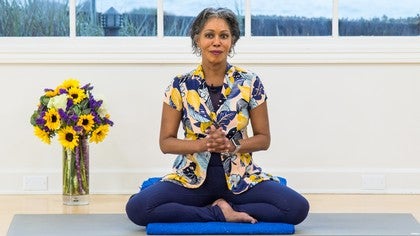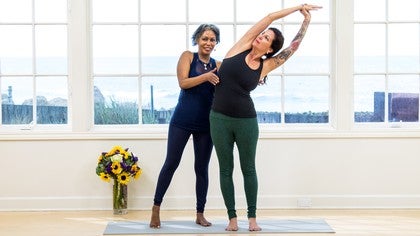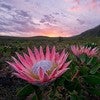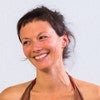Description
About This Video
Transcript
Read Full Transcript
Hello, everyone. My name is Nikki Myers, and I'm very, very grateful to be here with you for the yoga of 12-step recovery. I'm going to begin this by doing a little intro that, you know, I don't care where I was speaking. If it was in front of the United Nations, I'd do the exact same thing. And I begin by saying again, hi, my name is Nikki, and I'm an addict. I'm an alcoholic. I'm a codependent. I'm the survivor of both childhood and adult sexual trauma. I'm a love addict. I'm a recovering debtorspender, and I am an MBA. I am a yoga therapist. I'm a somatic experiencing practitioner. I am the mother of two living and one deceased child. I'm the grandmother of five, and I'm the great-grandmother of one. And I say all of that with the exact same gratitude and grace, the exact same gratitude and grace. What I've discovered is that when I exalt one part of myself and diminish another part of myself, that what I do is set up a split, that there's a war, an internal war inside, a duality. And when that happens, it's the antithesis of yoga. Yoga means union. It means balance. It means integration. It means wholeness. And so when I set up that split, there's a war inside. Part of the healing for me, a big portion of the healing for me, has been how to reintegrate all parts of myself, all parts of myself. So what I've discovered in healing all parts of myself is that it's impossible to heal what you do not acknowledge. So very often I've been asked, why would you say you're an addict, an alcoholic, and all of those things, that those are quote unquote bad, bad things, right? But again, what I've discovered is that it's in this healing all parts of myself that it's possible to come back to a sense of wholeness. For me, it's like that Rumi poem. So the Sufi poet Rumi, one of his poems was called The Guest House. And there are a couple of lines in that poem that I believe specifically apply to this. He's talking about different emotions and different states of being. And the line is we welcome and entertain them all. We welcome and entertain them all. He says they may be clearing us out for some new delight. And so this is exactly what this has been for me, reintegrating all parts of myself in this way. In order to do that, what I've discovered is that I used to escape pain. It was a mechanism for me to escape pain. And over the years, I found that, you know, there are times when I'll use anything. It doesn't even matter. In our conversations, we are going to make this whole conversation around addiction even bigger than alcohol or drugs or substance. Very often when we talk about addiction, many people will limit it just to a substance. Our idea here is to expand it even beyond a substance, to take it from a yogic point of view that allows us to begin to see whenever we're attached that that is, in effect, a form of addiction.
So for me, one of the greatest gifts in my own recovery was finding the 12-step program. Very gratefully, in 1987, I walked into the rooms of my very first 12-step program. The 12-step program is something that, over the years, since it's being founded in 1935, has helped millions and millions and millions of people find a path toward recovery. So I'm very grateful that the 12-step program became a part of my life. As a matter of fact, what I like to say about it is that the 12-step program has been my lifeboat and yoga's been my launching pad. Yoga's been my launching pad. So when I found the 12-step program, and this was actually in 1987, I came into the 12-step program and the way that I usually talk about it is that I could barely put a sentence together when I first walked into the room. I had been beaten up pretty badly in the throes of addiction. And I found people there who truly did love me, so I could learn how to love myself. And for that, I am deeply, deeply, deeply grateful. And I'm deeply committed to the 12-step program. A lot of it has to do with the way that I was cared for when I couldn't care for myself. So the story is that when coming back into the program, after a while, things started to really get better, I ended up going back to school. And I completed my undergrad degree. And then after that, as a matter of fact, in my undergrad degree, I got straight A's. So I recognized I had a few smarts still in this whole thing. All the gray matter wasn't gone. And then I went on to graduate school to do an MBA. And I completed the MBA with one B. I always say I'm still kind of working on a little bit of resentment with the teacher that gave me the B, but it's going to be okay. So I say that to say, again, as we talk about addiction, one of the perspectives that we'll talk about it from is a model that comes from the Upanishads that speaks about us having five bodies. So this is a yogic model that comes from the Upanishads called the Pancha Mayakosha model. And it speaks of us as not having just one body, but there are five bodies. And one of the things throughout the course of what all of us are in the context that we're working in today, we'll speak about a sustainable platform of addiction recovery that needs to address not just one body, not just the intellectual body, but all five of the bodies. Very important. I did really well in school and you know, with all the A's and all that kind of stuff. But what I've discovered is that, you know, left to the intellect alone, that you can think your way right into a coffin, that this is something bigger than just the intellectual mind. And this is kind of where what all of us are came in, right? Beyond the intellect, what we do here is combine the cognitive and the somatic. The theme of what all of us are is the issues live in our tissues. And what we've discovered is that there needs to be a way as a part of a sustainable platform for addiction recovery to release what's held in the body. And over the course of our work together, we'll talk much more about that. One of the big things as well for me is that after this time in going back to school and all of that, I started working in a corporation and I was doing really good things really well. And all of a sudden I began to believe that, you know, I was done with this thing. I was done with the drugs, the alcohol, you know, I had this great job. I was doing all this traveling and all this great stuff. And after eight years, and the story is really fascinating to some degree.
After eight years clean without a drink or a drug in my body, a very long story short, I ended up in Amsterdam and in Amsterdam I'm in relapse. Now here's the interesting thing about that. I hadn't had a drink or a drug in my body in eight years. But the moment I landed in Amsterdam, I knew exactly what to do. I knew exactly where to go. I knew exactly who to find. I knew exactly how to talk, to find my drug of choice in a foreign country, in a foreign country. I say that and it still amazes me. But that's going to get at what we'll speak to a little bit later here in yoga speak called Samskara. That these are habits, are patterns, they're things that are there. And I can't forget that. It behooves me to do my work in order to not let those habits and patterns come back to the forefront, come back alive again. Which is why this combination for me of yoga and the 12 step program has been so important. On the flip side of that, so I'm in Amsterdam, I relapse. I finally found my way back to the States and it was then after that first relapse that I found my way back into the yoga practice. I had been introduced to yoga in the 70s and really knew that there was something there. Really knew that there was something there, but let it go. Many other things distracted me. And so when after the relapse and finding yoga again, finding the rooms of the 12 step program again and then finding yoga again, I really began to get deep into yoga philosophy. There was something about the practice that I felt added so much to my recovery. My recovery. And so I began a really intense study of yoga then and reading all these books. And one of the very first books that I read was a book called The Heart of Yoga by TKV Desikachar. And as I'm reading through it, I begin to see all these similarities, all these references that reminded me so much of what I'd known from the 12 step program. And I was amazed at that. Absolutely amazed. And then I decided after studying yoga for a while, was I decided that I didn't need the 12 step program anymore, that I had this new yoga thing and it was going to save me and this was all I needed. Well, after four years clean that way, I relapsed again. I relapsed again. So with this relapse, I'm kind of like WTF, right? You know, how does this happen? How does this happen? I'd gone back to school, gotten all these days, knew I had a few brains, right? And, you know, I had done this stuff with yoga. I knew that there was something there. What I had not done is really connect the two. I had the 12 step program in one box. I had yoga in another box. And what was necessary that I discovered for someone like me was that I needed these two things married in a way that they were seamless and completely, completely, that there was no artificial separation between them. And out of that, Y. Tovisar was born, some 13, 14 years ago now. Y. Tovisar was born. Y. Tovisar is a relapse prevention program and it's modeled off of the key Yoga Sutra from the Yoga Sutras of Patanjali that we use as a guide for the program is Yoga Sutra 216. Yoga Sutra 216 says Heya Dukkha Anagatam. And what that means is future suffering can be avoided. Future suffering can be avoided. And really, that's the whole goal. Addiction is at pandemic proportions in the United States right now, really all over the world. Pandemic proportions. In 2016, overdoses were the leading cause of accidental death in the United States, more than car crashes, more than any other cause of accidental death. There were 52,000 overdoses in the United States in 2016. And now we're just talking about drugs. We haven't even included alcohol or any other addictions. So we can see that this is at pandemic proportions. With those numbers, one of the things that we begin to see is that this affects all of us. It affects us all in one way or another. And this bigger point of view from Yoga helps us to see that really, when we think about this in terms of attachment and all that really ultimately, we're all addicted to the way we process our reality. We're all addicted to the way we process our reality. And when we think about it from that perspective, it helps take some of the stigma out. It helps to begin to take that stigma out, which is very important. We begin to see that the addict is no different from anyone else. They're in a particular phase of acuteness with their disease, but ultimately they're no different than anyone else. We are all at some level addicted to the way we process our reality. So with this bigger understanding, we can begin to take the stigma out of addiction.
We can begin to take it out. And when that happens, more people will be willing to come forward that may be wanting or needing help without the stigma attached to it, without all of the stigma that keeps people from coming forward. So that's what ultimately the hope is with this program, that we find a way to begin to see that addiction is a chronic disease just like any other chronic disease. And that actually in many ways, it's more treatable than most chronic diseases. The first thing that's necessary is to admit that you have it, to admit that you have it, that that's what's going on. So I am really grateful to be here to offer the yoga 12-step recovery on yoga anytime. We are going to do a series of lectures and some practices. We have what we call a couple of mini interventions. And these little interventions are just what I love to think of as little yoga snacks, if you will. In a time when I feel triggered or a time when, you know, I feel some level of activation, I always recognize these as kind of my go-to tools. They're the go-to tools that I can use to help restore balance in my nervous system. So I'm very grateful to be here with you. Thank you for joining me. And I look forward to being with you throughout the rest of the program.
Yoga of 12-Step Recovery
Comments
You need to be a subscriber to post a comment.
Please Log In or Create an Account to start your free trial.
